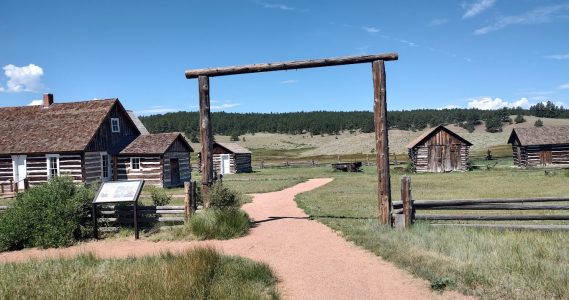Hornbek Homestead, CO 2024
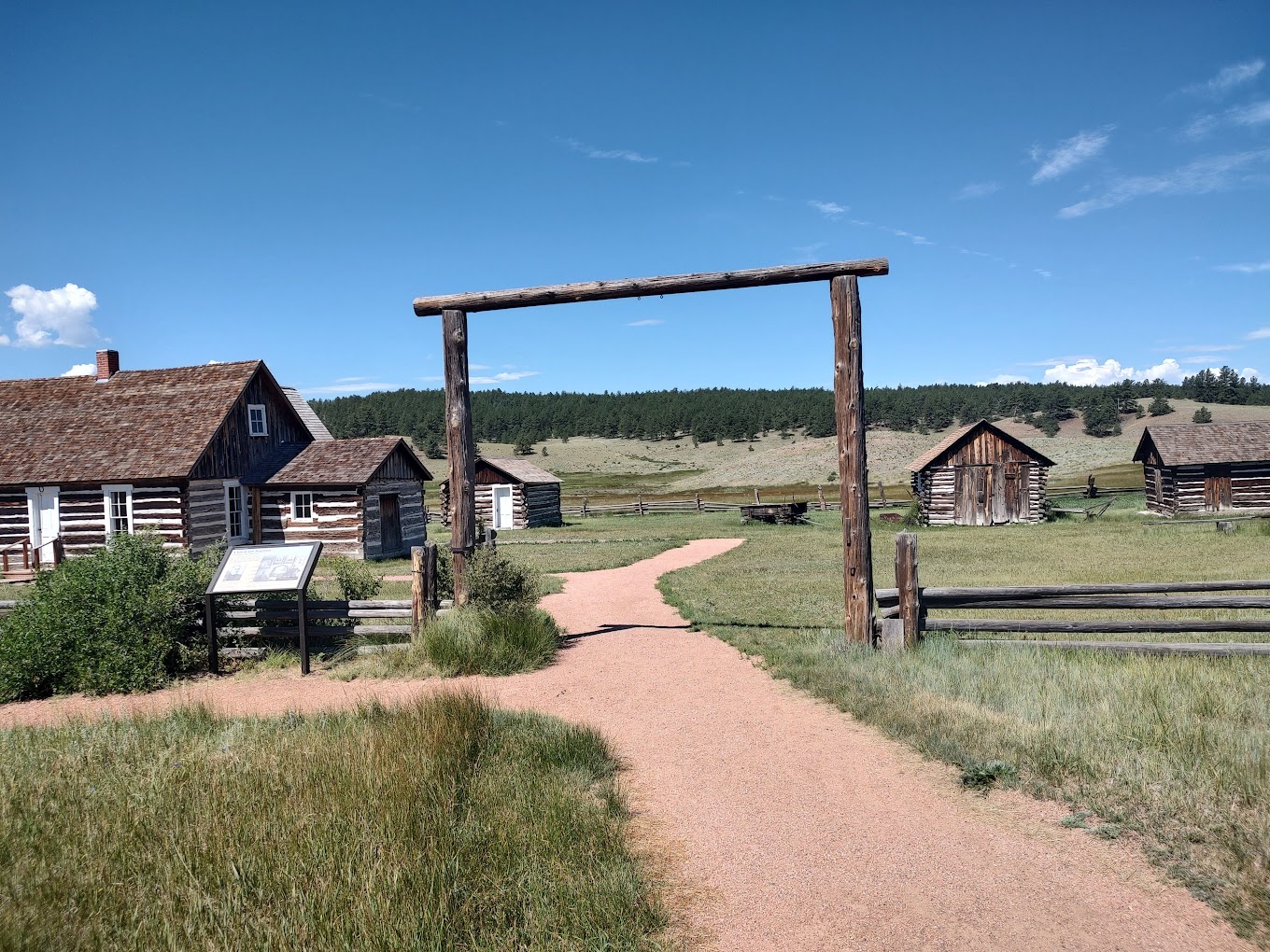
In the shadow of Pikes Peak, HistoriCorps returns to the Hornbek Homestead to continue our work with the National Park Service in Colorado’s Rock Mountains!
PROJECT PARTNER: Florissant Fossil Beds National Monument
SESSION DATES: June 9-14, and June 16-21
PROJECT SUPERVISOR: Steve Harris!
CREW LEADER: Ethan Raath!
Project Site Description & History
The Hornbek Homestead is an outstanding example of log domestic architecture from the Rocky Mountains of Colorado. Built in 1878 by Adeline Hornbek, single mother of four children and early settler, the Hornbek Homestead is one of the first settlements west of the 14,115′ Pikes Peak and is significant for its association with the Homestead Act of 1862 as being the first application to the Florissant area.
Over 150 years years after its construction, the homestead survives under stewardship from the Florissant Fossil Beds National Monument which was established in 1969, along the homestead being sold to the national park service in 1973. The National Monument is primarily known for its unique collection of fossils from the Eocene Epoch which occurred over 344 millions years ago. Tourists and fossil heads alike flock to the monument for its unique and shockingly deep collection of plant and insect fossils, including its popular petrified Redwood Tree still partially intact and in the ground!
In 2018, HistoriCorps engaged volunteers to restore the primary log house including instillation of wood walkways to help preserve the property. Additionally to the log house, the property includes a number of outbuildings which were relocated to the site. This season, we set our sights on restoring the traditionally constructed outbuildings which include a Bunkhouse, Carriage Shed, and Milk Barn.
As of 1981 the Hornbek House was listed on the National Register of Historic Places and awaits its next phase of restoration. HistoriCorps proudly invites you back to Colorado for a project rich in history and made for lasting memories. To learn more about the Hornbek Homestead, please visit the National Park Service’s website.
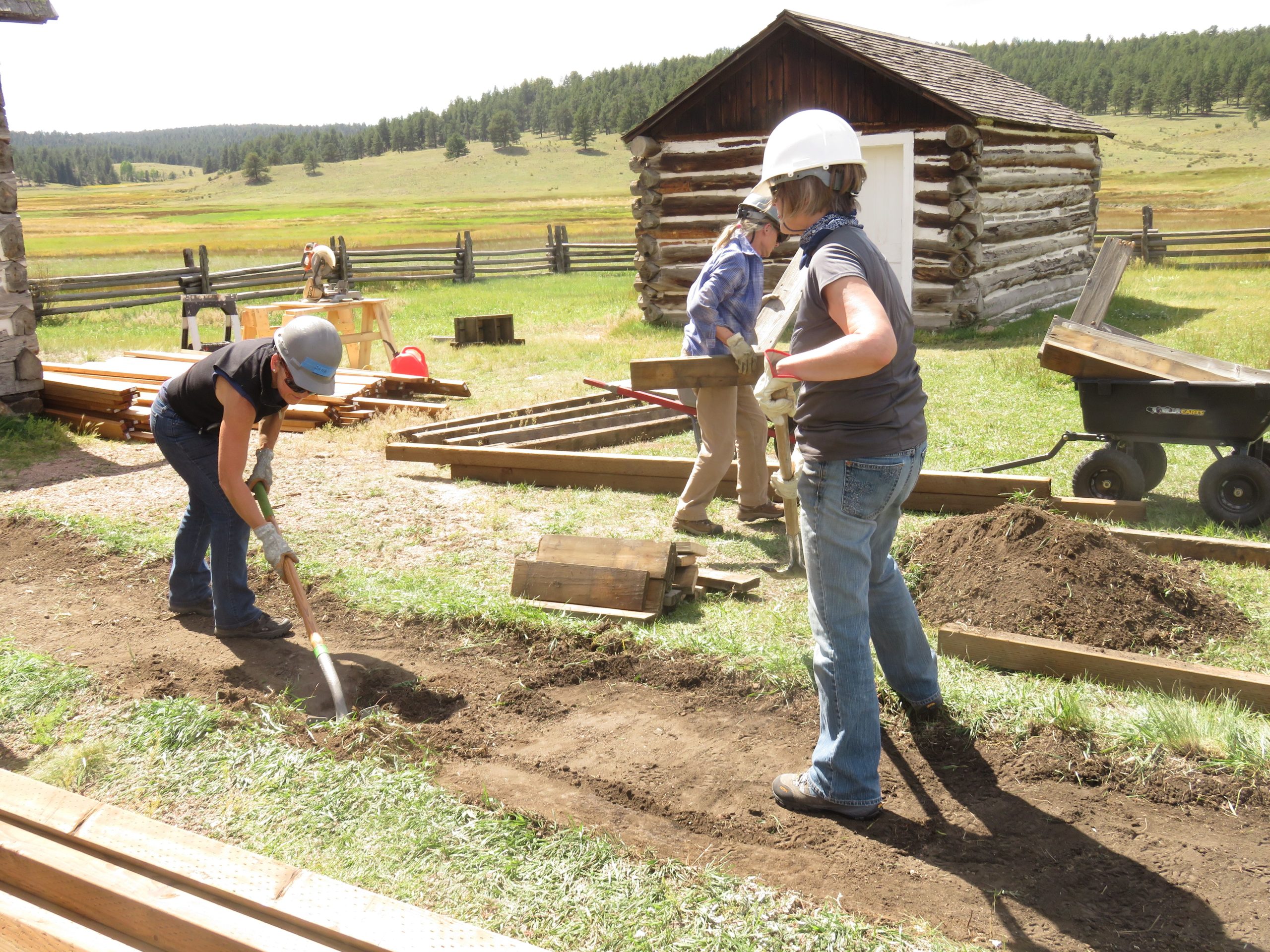
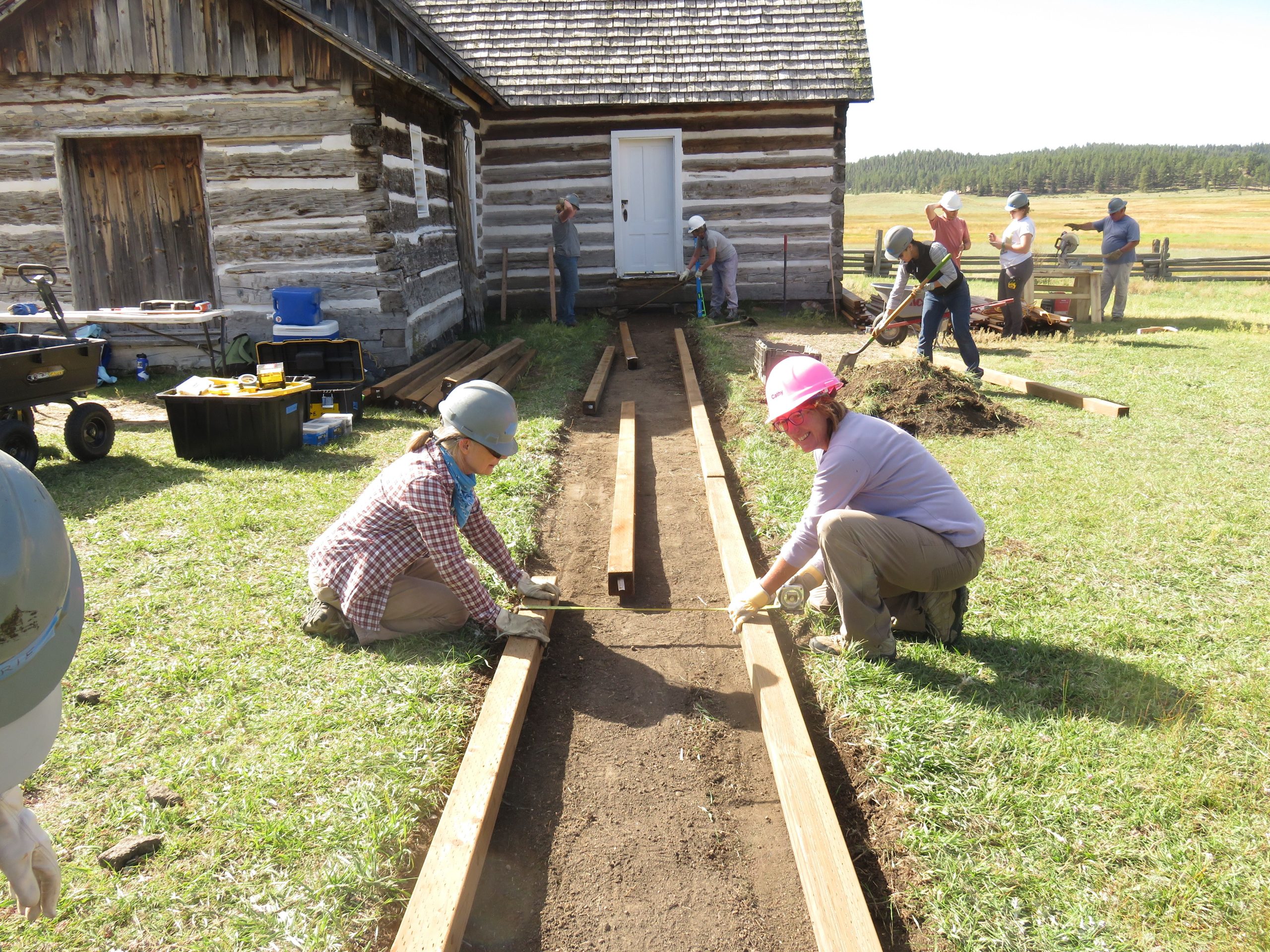
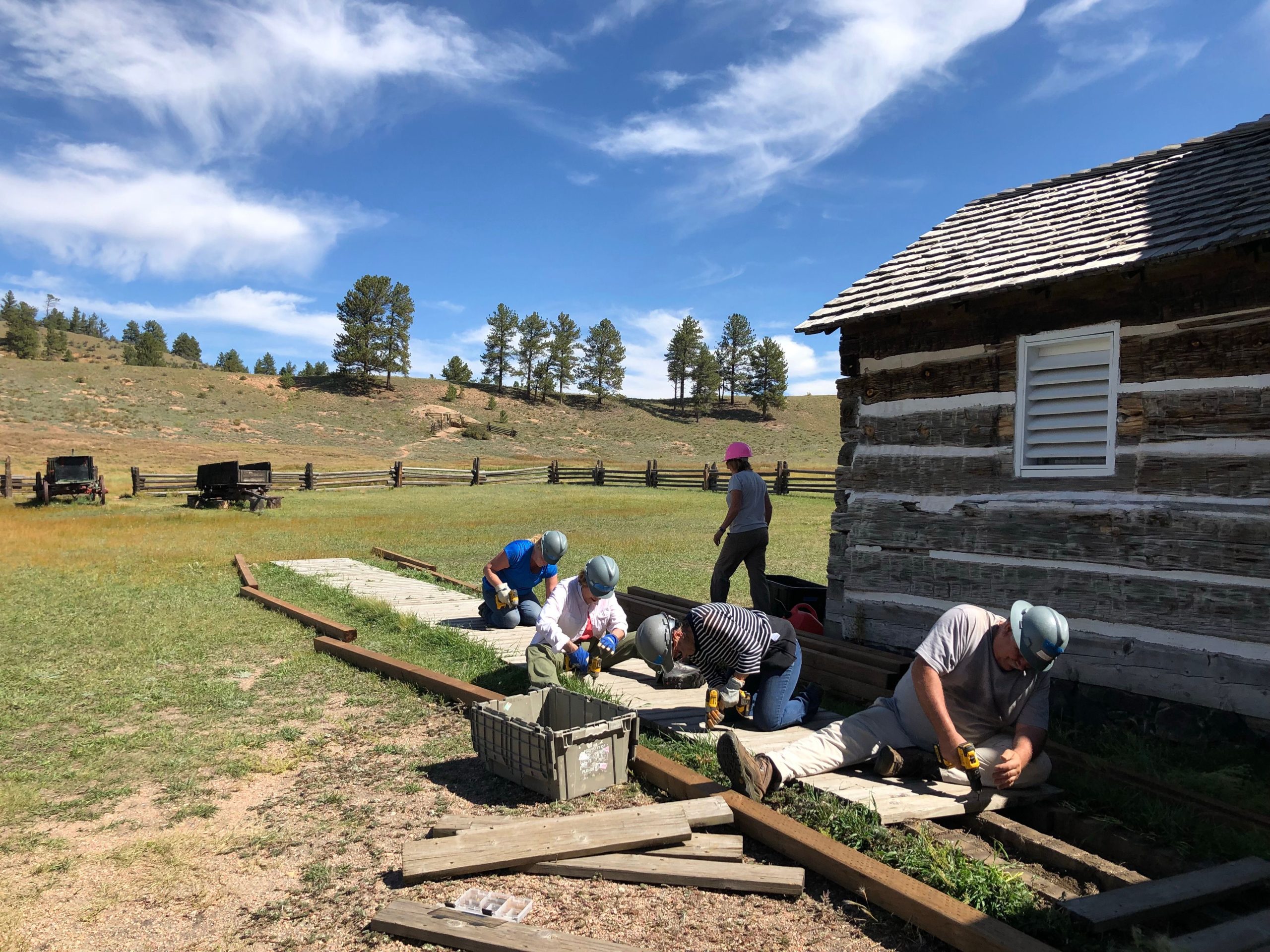
Location and Logistics
SESSION DATES: May 26-31, June 2-7, June 9-14, and June 16-21
Please plan to arrive at the campsite no earlier than 5pm and no later than 7pm on the first day of your session.
LOCATION: Located approximately 50 minutes Northwest of Colorado Springs!
ACCESS: ![]()
![]()
![]()

![]()
Tents, truck campers, and small campervans are welcome. RVs and trailers cannot be accommodated at this project location. Showers are available but dogs are not permitted.
WEATHER: Anticipate highs in the 70s and lows in the 30s. Weather conditions may be rainy, cloudy, or sunny. Volunteers are responsible for checking weather conditions before their session begins, and packing appropriately.
ABOUT VOLUNTEERING: HistoriCorps projects are free for volunteers! HistoriCorps will provide all meals, tools, training, equipment, and a campsite. Volunteers are responsible for their own transportation to the campsite, sleeping equipment, work gloves, clothes and boots, and other personal gear.
Scope of Work
HistoriCorps is committed to educating and training volunteers in preservation skills, with an overarching mission of inspiring a preservation ethic in all those involved. Learning and working alongside expert HistoriCorps field staff, volunteers and applying the traditional skills necessary to restore the Hornbek Homestead:
Bunkhouse:
- Repair and replace sill and wall logs
- Repair and replace failing daubing
- Paint exterior, door frame, and window frames
Carriage Shed:
- Repair and replace deteriorated logs
- Stabilize structure
- Rebuild and hang double barns doors
- Replace missing or failing daubing and paint
Milk Barn:
- Replace missing shutter battens with repurposed wood materials
- Apply wood preservatives to exterior logs
- Replace missing or failing daubing and paint
Please note: Tasks vary by day and by week, depending on a variety of factors including: weather, project priorities, previous groups’ work, and more. Though it is likely you will get to learn and practice most or all of the above tasks, it is not guaranteed. The higher percentage of the scope a particular task is, the more likely you will get to practice it.
Sign Up!
We’re thrilled this project has inspired you to volunteer!
CLICK HERE TO REGISTER!
Visit our Job Calendar to see spaces are available!
*All registrations submitted to projects at capacity will be automatically added to our waitlist.*
CANCELLATIONS effect our ability to complete projects. Please register only if you are certain about your ability to participate.
You will know your registration was successful when you receive a confirmation email. Contact volunteer@historicorps.org for assistance.
HistoriCorps does not charge for its volunteering projects. HistoriCorps relies on donations to continue engaging volunteers to save significant historical sites across America for generations to come. Your donation of any amount will make an incredible difference! Increase your impact – make a generous gift today.
Volunteer Logistics, Policies, and Advice
We’re so glad you’re interested in joining this project! If you’re new to our community, review the Volunteer FAQ first! Please note the following logistics and policies:
- Volunteering with HistoriCorps is free! We will provide all meals, tools, training, equipment, and a campsite or shared indoor lodging. Dinner is not provided on the first night.
- Volunteers are responsible for bringing their own gear, work gloves, sturdy work clothes and boots, and appropriate sleeping equipment. Check the average temperatures before you start packing – the nights and mornings may be colder than you anticipate! Then, read this advice about how to stay warm when tent camping in colder places.
- Campsite accessibility varies by project. Some projects can accommodate tents only; others can accommodate small RVs. Please review the project site description above for more information, and if you’re still not sure, email volunteer@historicorps.org for help.
- If this project does not offer showers, you might want to consider bringing a solar shower or research other methods to clean up after the work day.
- Volunteer crew sizes generally range from 4-8 volunteers, with two HistoriCorps staff that lead and train volunteers in the work.
- Safety is one of HistoriCorps’ top priorities, and volunteers can contribute to a safe working environment by ensuring their physical fitness is adequate for the work. See above for this project’s scope of work and difficulty level. Please, call us if you are not quite sure if a project is a good fit for your skills or fitness level. We may be able to suggest a project more suitable and enjoyable for you.
- Hard hats, eye protection, ear protection, gloves are standard personal protection equipment (PPE) required on all projects. Hard hats must be worn at all times on the project site, unless working in a designated safe space. Field staff will train volunteers on correct use of PPE.
- Dogs are generally allowed to accompany their humans in project campsites (actually, we love having dogs join us around the campfire!). Dogs are not permitted on the job site for everyone's safety. HOWEVER: HistoriCorps also follows the rules and regulations of our project partner. If the project partner does not permit dogs onsite then HistoriCorps is no exception. Please ask HistoriCorps or the project partner directly if you have any questions about whether Fido is welcome.

